There are quite a number of good reasons why many homeowners conclude that they would rather have central Air Conditioning Units In Attic, and it is often the right decision.

If you suddenly decide to consider this procedure, first sit down and think carefully about how important it is to your home and whether it’s even worth making this decision before calling, ordering, and installing an attic window air conditioner.
This is all-important because dismantling an air conditioners in your attic or trying to move an attic window ac unit from one place to another requires a fair amount of effort.
The attic of a log house needs ventilation and central air conditioners system. The need for the installation kit of quality climate remote control equipment is due to overheating of the room in the summer. Strong indoor cooled air heating has a negative impact on the state of the interior decoration, making the stay in the room uncomfortable.
Consequences of condensation due to lack of fresh air circulation are cracking of the wood and rotting elements of the rafter system. The causes of condensation are also called the lack of attic heating and a good fan in the attic. By the way, before you decide to install the fans you need to know about attic fans pros and cons.
A modern air conditioner will avoid the appearance of condensation and intense air heating.
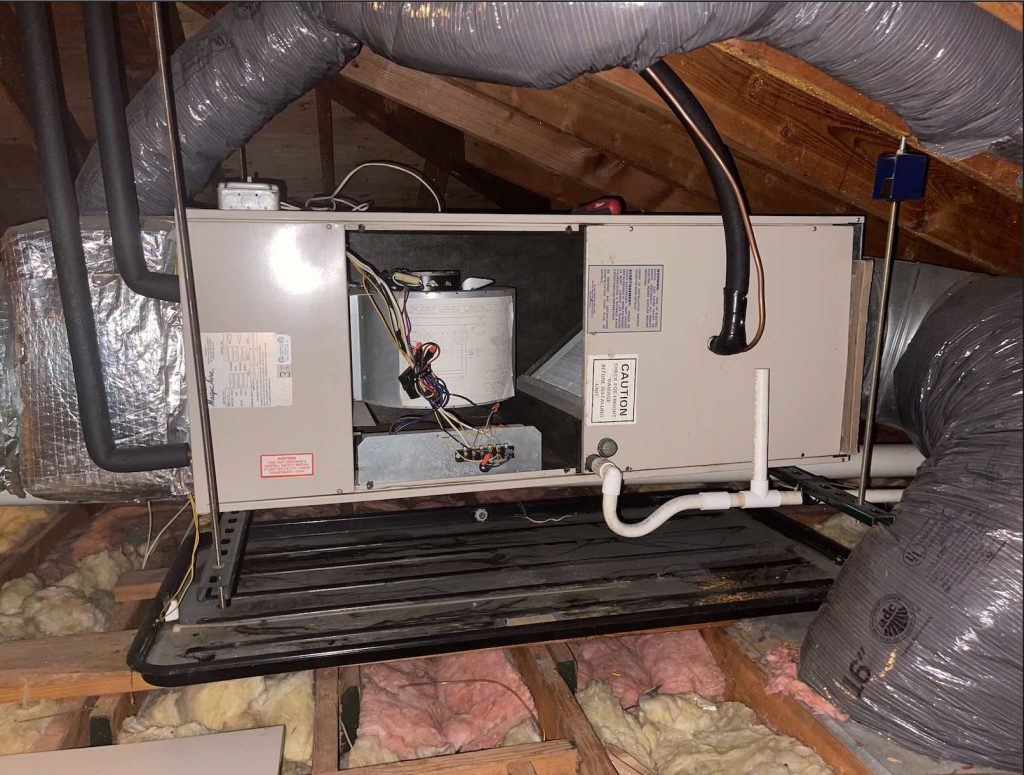
In this article, after performing a detailed analysis, we have tried to highlight all the major pros and cons of the attic air conditioner to help you decide on your final decision. As with any choice you make to modify your home and add new elements to it, you need to be sure to consider all the positives and negatives and take your time to consider in detail what your priority is.
All in all, it is up to you and your relatives who live in the house to properly decide whether or not you need a window air conditioner in your attic at this time for a favorable and comfortable life in that home.

Sometimes, installing a suitable attic AC unit is a better option if you intend to use your attic than growing your central air conditioner system.
Why Do You Need an Air Conditioner in the Attic?
Although they used to be regarded as storage areas Attics are currently turning into value-added house space.

The idea of converting attics started out as an exciting remodeling idea However, they soon was a more pressing requirement. The extra space for a home office as well as a studio, guest room and library in your home or whatever you think best suits your requirements.

The most significant issue that could present itself is cooling your attic, which isn’t an easy task. It is therefore essential to put in an air conditioner within your attic.
- The attic air conditioner can help keep your temperature at a moderate level within your attic.
- Attics that are closed off humid and warm air could be able to enter, causing the humidity level can be high. This could encourage the growth of mold. As an air conditioner cools by eliminating water vapors from the air inside, it can assist in controlling the levels of humidity within the attic.
- The heat from the attic transfer the warm air to the below levels. This is especially true if your attic isn’t well ventilated and properly insulated. The result is a change in the home’s temperature, which puts a burden the HVAC unit, and raising your costs for cooling.
- A roof-mounted air conditioner extends the lifespan of your roof, by eliminating excessive moisture and heat, because both of these things could harm the structural integrity of your roof.
The Air Conditioners In the Attic: Pros
AC units save space
AC units in the attic save a lot of available space – most often, freshly installed residential air conditioner systems are either two independent units or split units.
The outdoor unit, also called “central air conditioner” by some people, includes a single condenser and compressor ac systems.
The indoor unit contains the evaporation system and the fan directly. In many cases, the inside of the system can be placed in your closet or any other utility room.

In some cases, the attic-mounted attic air conditioner are generally the most advantageous place for this part of the attic ac unit. This applies mostly to older homes in North Carolina and South Carolina, where the space in which you can keep things is minimal.

If you need to maximize the available space in your home, installing an attic space HVAC system will play a significant role in this matter.
Attic AC cost less
It’s not as expensive to install a system AC in the attic as it is in other places – since workers can throw ductwork in the attic without proper protection.
They’ll need to do a lot less finishing work, and the attic air conditioner themselves usually costs much less than units that are installed in other parts of your home ac in the attic.

If you’re really on a budget, a window AC unit may be a better choice than a portable attic air conditioner or mini-split air conditioner. This window attic air conditioner is ideal for smaller attics.
Cost is the main argument for most private homeowners, and it’s mostly this factor that ultimately helps you decide to put your AC system in your attic. So, is an attic furnace installation a good idea?

In this video, you will find information on 5 main pros and cons, highlighted by the technician with a great experience.
Attic AC Units: Cons
Can be inefficient
Attic heating and AC units can use a lot more electricity. The main negative factor about attic air conditioners is that they are usually of little use when energy savings are considered. Contractors often try to increase return and cooling efficiency by carefully sealing all available ductwork in your attic.

Despite this, the chance of a small air leak, while small, exists, and you should consider it.
These seemingly small air leaks can later cause huge utility bills and reduce the comfort of your private home. So, think carefully about this issue: whether or not you’re willing to pay a little too much for electricity.
If your ac unit is leaking water into the attic, you may have a blocked drain line or a dirty air filter. It will be resolved if you clean your AC filter and drain pipes. It is advisable to speak with an expert if the problem is still not fixed.

Can have undetected problems
There is another problem that is inferior to the previous one, but it still exists and cannot simply be ignored. With an attic air conditioner, malfunctions can occur that you may not know about for a long time at all.
Let’s take for example an air conditioner, which is in a storage room in your house.

If it works strangely or produces something not typical for its sounds, then you will most likely hear it at once and you will understand that something is wrong.
But you do not hear sounds so distinctly in a loft, and you visit it very rarely, therefore it can take a long time before you understand that something went wrong.
And the longer the conditioner is working in an unstable mode, the more expensive for you the repair in the future.
Not suitable for small attics
Another problem is that an air conditioner needs floor space in the attic. For smaller attics, you may want to consider a mini-split system, as these models sit high on the wall and don’t consume any floor space.
A window air conditioner is another good choice, especially if you need a small air conditioner for the attic. They are the most inexpensive among all the other air conditioner options.
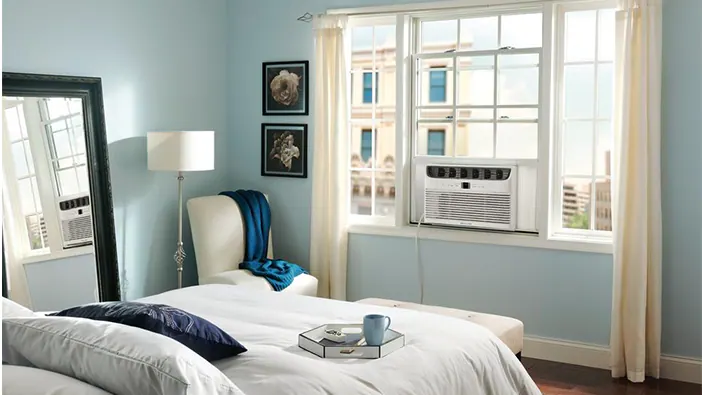
Thanks to the given cooling capacity, this window air conditioner is able to work well in an up to 450 square feet area.
Their energy efficiency ratio is better than portable air conditioners but not as good as mini-splits.
Portable ac units aren’t usually the best option for tight budget spaces, a portable air conditioner requires a designated amount of floor space and can detract from the already-limited square footage. Besides that, the portable air conditioner for the attic is not as energy efficient as it should be.

All of these ac units have their pros and cons, but it all depends on what you want from the best attic air conditioner.
So check your central air conditioning system more often if you do decide to put it HVAC in the attic.
Things to Consider When Buying an Attic AC Unit
The attic is the area of your home that is most vulnerable to temperature changes. Additionally, the odd form of roofs with slanted edges makes it difficult to get a good space for the walls. This is the reason why not all portable air conditioner is suitable for installation in this area.
Below is a checklist of the things you must think about before purchasing an air conditioner to cool your attic.
1. Attic Insulation
Prior to creating the AC within your attic, make sure there’s no space that’s not insulated. If the attic has vents or is not well-insulated, there’s no need to air condition it as you’ll wind up having to lose all the cool air. The AC unit in your attic is already working longer than the normal air conditioner to cool warm air. When this happens an absence of insulation can further reduce the effectiveness of the AC unit.
2. Heat Pump for Year-Round Comfort
It is helpful to search for an air conditioner designed for your attic which can supply the cooling you require in addition to heating, so you be comfortable during all seasons. It will eliminate the requirement to put in two pieces of equipment to cool and heat your attic.
3. Ease of Installation
Based on the space in your attic Choose an attic air conditioner that will fit and can be easily installed. In the case of an air conditioner that is window-mounted for an attic with tiny roof windows is extremely complicated. In the same way, portable units will not work in tiny attics as they occupy the floor central air conditioning system.
4. Air Conditioner Sizing
It’s vital to purchase an AC system for your attic that’s adequate in dimension. Twenty British Thermal units (BTUs) per square foot is enough for normal indoor spaces however attics differ. They hold in heat from the home and absorb sunlight from the sky. They become extremely affordable hot in the summer months sun exposure.
Thus, for a total of 400 square feet of space, you’ll receive 8000 BTUs based on the formula. You should however select an air conditioner that is a minimum of 10,000 BTUs to be used in your attic. This won’t cause your air conditioner in the attic to perform more than what it is capable of and preserve the efficiency of cooling.
5. Energy Efficiency
When choosing an AC for your attic, be sure to verify for the EER ratings of your AC unit. The ideal is the air conditioner to have an EER rating that is not less than 9. The air conditioners that have EER ratings of 12+ can be the most efficient in terms of energy savings.
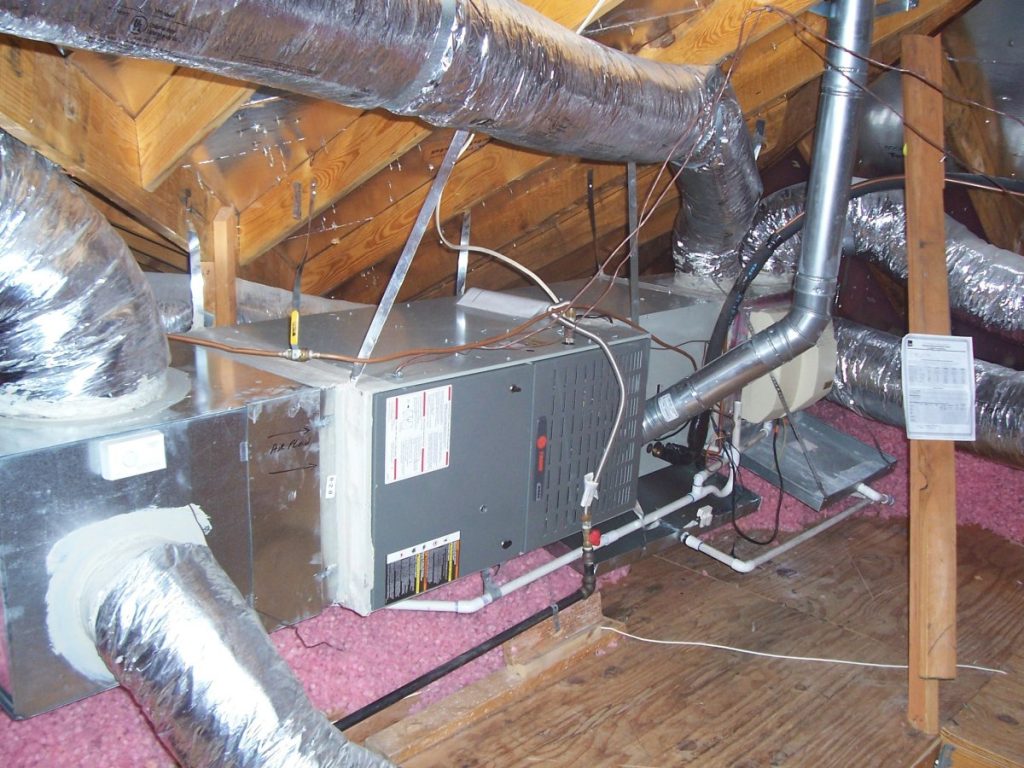
6. Durability
Be sure to keep the factor of durability at the forefront when purchasing the attic AC unit. As an example, a quality mini-split is able to last 15-20 years. In contrast an portable AC could be more practical and cheaper, however it will not last for more than seven to 10 years.
Types of AC Units Suitable for Attic
In the case of setting up an AC for the attic there are a variety of sorts of ACs to pick from. If you don’t have air ductwork within the attic, it’s expensive to remove walls in order for ductwork to be installed in the attic, and connect it with your existing HVAC unit. So, installing central air conditioning unit within the attic space is not efficient. The result is that you have a choice of a ductless air conditioner that can be a lot less trouble.
1. Mini-Split Air Conditioner
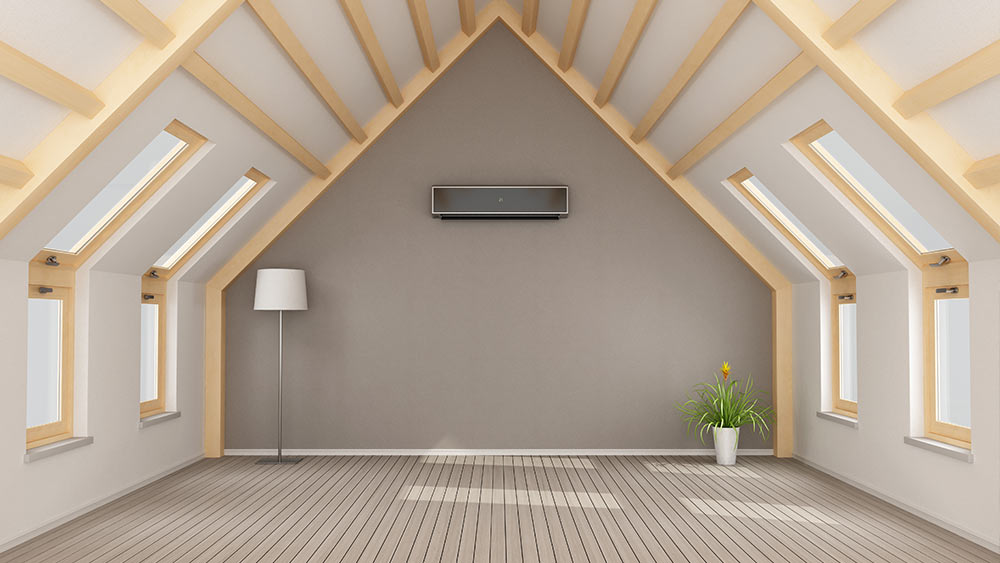
Mini-split AC units are the ideal option for an attic air conditioning. They’re portable ac unit are durable as well as energy efficient. Because their loud part (compressor) is situated on the outside of your home the unit operates silently.
While the attic AC units may be more expensive however their longevity, silent operating, straightforward installation and efficiency in energy use make them the ideal alternative. They’re positioned at a high level on the wall therefore you’ll never face problems with space, however they’re not suitable for homes where the walls aren’t long enough.
2. Window Air Conditioner
A window air conditioner can be an option, especially when you require a smaller air conditioner to cool your attic. These are the cheapest of all choices for conditioning in the attic. Their efficiency in energy is higher than portable ones, but less than mini-splits.
It is essential ensure that you have the right inclined windows to allow for this type of AC. It is nearly impossible to mount attic air conditioners in small or inclined windows.
3. Portable Air Conditioner
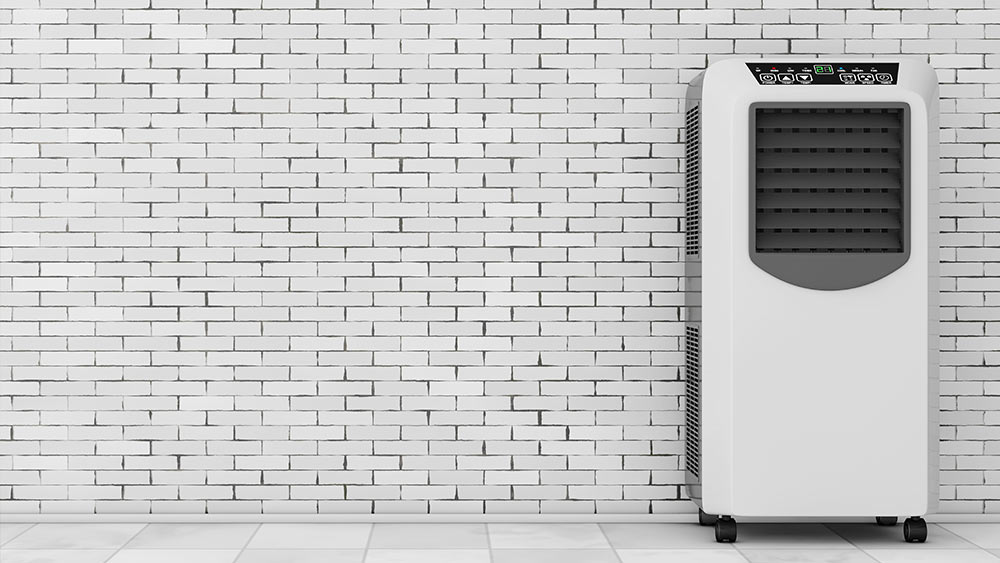
Portable air conditioners have at least two or more pipes that must be vented via a window or wall. This is necessary to remove hot air and effectively to cool the attic. Connecting a hose is challenging at times, dependent on the dimensions of your attic’s window as well as its location. If your window air conditioner is accessible it is simplified by using windows that typically has the ability to use portable AC units.
The popularity of portable units is that they are able to be moved conveniently, yet they make up an enormous amount of space. The other issue is that air conditioners portable that are designed for attics aren’t nearly as efficient in terms of energy as they could be. In addition, they’re less reliable than mini-splits or window units.
4. Through-the-Wall Air Conditioner
The term “through-the-wall AC” refers to these air conditioners. through-the-wall ACs due to the fact that they’re mounted by making a huge hole into the wall. For attics the process of drilling this hole could be quite difficult and must be handled by experts only. Furthermore, they’re large in terms of size. Therefore, they’re not aesthetically appealing.
Other than the issues with installation as well as aesthetics, there’s little to be unhappy about. They aren’t so expensive like mini-splits or portable AC. The other benefit is the fact that they’re extremely energy efficient. They’re second the mini-splits.
Attic Air Conditioner to Regulate HVAC System
A few people install their central conditioning installed in attics. This is because the installation of an HVAC system inside the attic can save area. Furthermore, installing portable ac unit in the attic can be cheaper and simpler. The only thing you need to do is put in the unit, and then place it where you want to. There is no need to wrap it up and complete the final touches.

But, attics are also the hottest area of your home and could reach temperatures of 100-150F. However, the ducts’ air are cooled down to a less temperature. As heat is transferred from a region of more temperature to an area that is lower in temperature the difference can cause an increase in heat in the attic, particularly when the attic and ducts aren’t adequately insulated. If this is the case you could use the ductless AC inside your attic installation to control the temperature. It is possible to run your attic AC with a higher degree of temperature that will stop the heat from entering. It will increase the effectiveness of your central AC system, but will also reduce the cost of cooling.
Conclusion
The first step in controlling the temperature in your attic is to select an air conditioner, but before making your decision, there are a few things to take into account. Make sure you have enough ventilation and insulate your attic before investing in an air conditioner. This will assist in retaining the cold air your attic air conditioner generates, energy efficiency usage in your house, and maintaining healthy indoor air quality.
